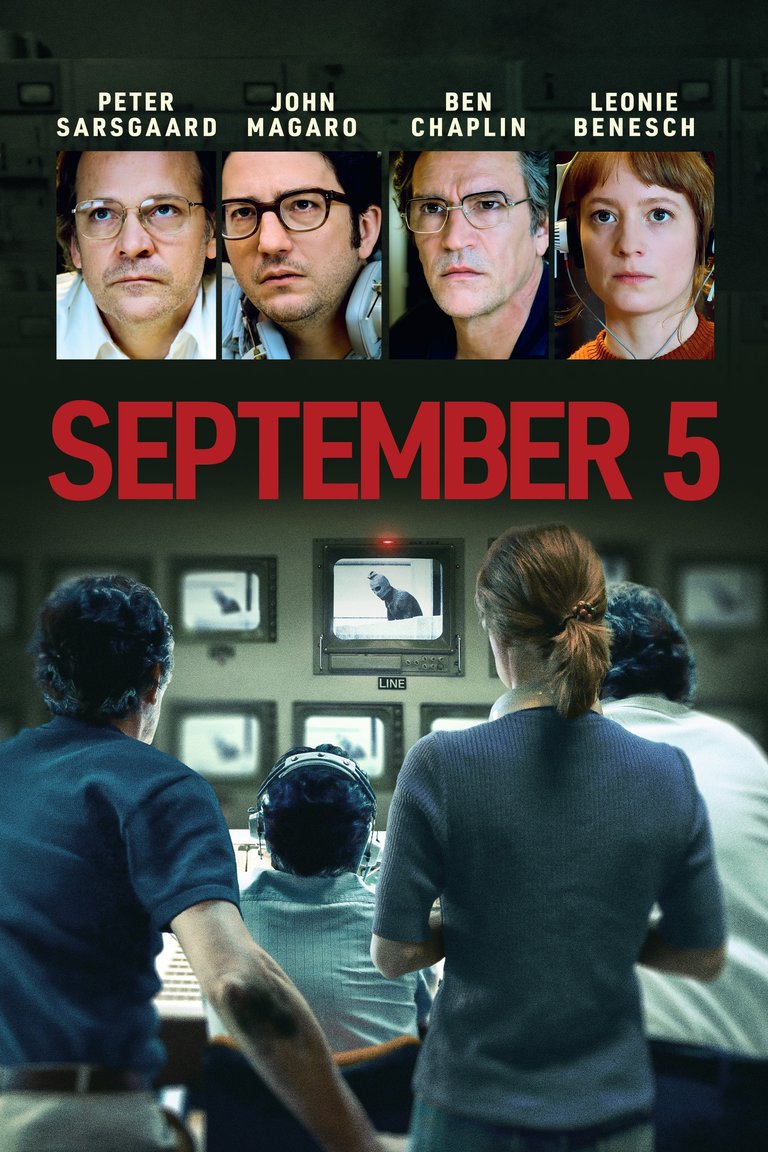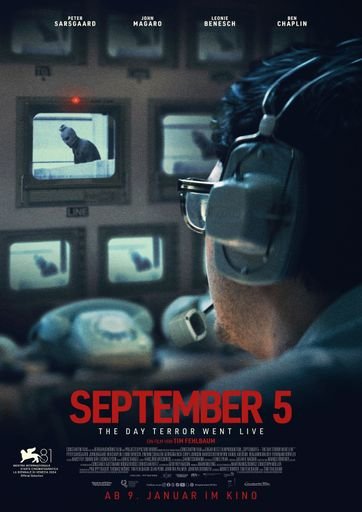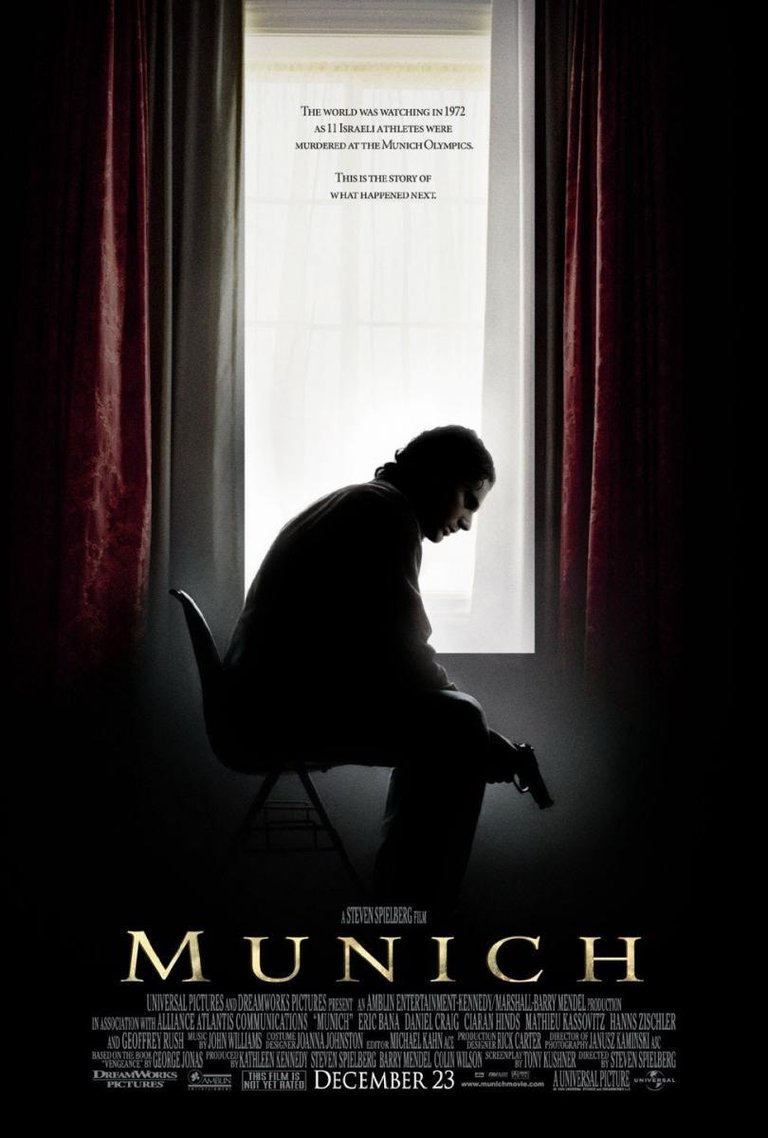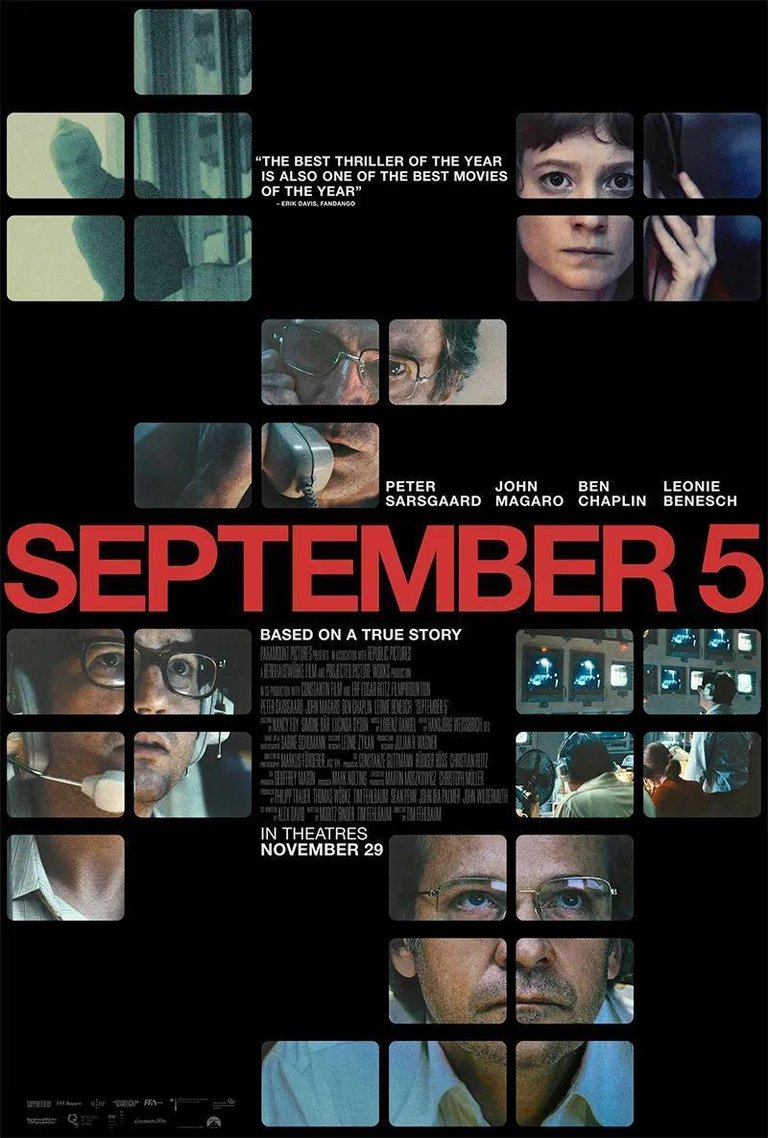September 5 (2024): thriller, sports and journalism | thriller, deportes y periodismo

Nominada a Mejor Guion Original en los premios de la Academia
This was another one of the movies that I hadn't heard anything about until the Oscar nominees were released. It had not reached the billboards in the city where I live, I hadn't seen any type of trailer the times I went to the cinema and I hadn't found anyone who talked about it. And even if it only has one nomination, the fact that a film makes it to the final list of five nominees in the Best Original Screenplay category - one of my favorite categories - is reason enough to pay attention to it.
Esta fue otra de las películas de las cuales no había escuchado nada hasta que se publicaron los nominados a los premios Oscar. No había llegado a las carteleras de la ciudad en la que resido, no había visto ningún tipo de avance las veces que fui al cine y no había encontrado a nadie que hablase de ella. Y aunque sólo tenga una nominación, el hecho de que una película llegue a la lista final de cinco nominadas en la categoría de Mejor Guión Original - una de mis categorías favoritas - es razón suficiente para prestarle atención.
September 5 is a German film - although filmed almost entirely in English - directed by Tim Fehlbaum and co-written by him with Moritz Binder and Alex David. It's a dramatic thriller based on true events that focuses on one of the most painfully memorable days of the second half of the 20th century. In September 1972, less than thirty years after the end of the Second World War, the Olympic Games were held in the city of Munich. It was promoted and seen as an opportunity to turn the page on the dark history of Nazism and show the world that Germany was not Hitler and the Holocaust. Fairly recovered economically speaking, the Germanic nation received thousands of athletes to celebrate sport, healthy competition, equality between people of different origins, creeds and nationalities, united by sport. The atmosphere had nothing to do with the Olympic Games held in Berlin four decades ago amid swastikas, Nazi salutes and other images that were immortalized by the talent of Leni Riefenstahl. On the other hand, and to give greater significance to the event, it was the first sporting event that would be broadcast completely live throughout the globe. The technological deployment so that millions of people around the world could see what was happening in Munich in real time was unprecedented. And in charge of that broadcast - for the US - was a team of ABC sports journalists who will be the protagonists of our story.
September 5 es una película alemana - aunque filmada casi enteramente en inglés - dirigida por Tim Fehlbaum y co escrita por él junto a Moritz Binder y Alex David. Es un thriller dramático basado en hechos reales que se centra en uno de los días más penosamente memorables de la segunda mitad del siglo XX. En septiembre de 1972, a menos de treinta años del fin de la segunda guerra mundial, los Juegos Olímpicos se celebraron en la ciudad de Múnich. Fue promocionado y visto como la oportunidad de pasar la página sobre la oscura historia del nazismo y de mostrar al mundo que Alemania no era Hitler y el Holocausto. Bastante recuperada económicamente hablando, la nación germánica recibió a miles de atletas para celebrar el deporte, la competencia sana, la igualdad entre las personas de diferentes orígenes, credos y nacionalidades, unidos por el deporte. La atmósfera no tenía nada que ver con los Juegos Olímpicos celebrados en Berlín cuatro décadas atrás en medio de esvásticas, saludos nazis y otras imágenes que fueron inmortalizadas por el talento de Leni Riefenstahl. Por otro lado, y para darle mayor trascendencia al evento, se trataba del primer evento deportivo que se transmitiría completamente en vivo a lo largo y ancho del globo. El despliegue tecnológico para que millones de personas de todo el mundo pudieran ver lo que ocurría en Munich en tiempo real fue una cosa sin precedentes. Y a cargo de esa transmisión - para los EEUU - estaba un equipo de periodistas deportivos de la ABC que serán los protagonistas de nuestra historia.

The atmosphere of celebration turned dark when, during the early hours of September 4, eight members of a Palestinian terrorist group broke into the rooms of the Israeli Olympic team, murdering two members and taking the others hostage. As the day dawned, there were already police cars in the area of the Olympic village, there was talk of negotiations with the terrorists, the atmosphere was tense, but the games were not cancelled, not at the time. Only after things got out of control were the competitions interrupted, but no one wanted to believe that what everyone feared could happen. Less than 24 hours later, everyone watching's worst nightmare came true.
El clima de celebración se tiñó de negro cuando, durante la madrugada del 04 de septiembre, ocho miembros de un grupo terrorista palestino irrumpieron en las habitaciones del equipo olímpico de Israel, asesinando a dos miembros y tomando como rehenes a los demás. Al despuntar el día, ya había coches de policía en el sector de la villa olímpica, se hablaba de negociaciones con los terroristas, el clima era de tensión, pero los juegos no se cancelaron, no en el momento. Sólo después de que las cosas se salieran de control, las competencias fueron interrumpidas, pero nadie quiso creer que podía ocurrir lo que todos temían. Menos de 24 horas después, la peor pesadilla de todos quienes observaban se hizo realidad.
This episode is quite well known. There was a film that came out a few years later, Spielberg made a wonderful film at the beginning of this century with a luxury cast (Eric Bana, Daniel Craig, Ciarán Hinds, Geoffrey Rush, Ayelet Zurer, Mathieu Amalric), several documentaries have been made, including 2006's Der Olympia-Mord: München '72 - Die wahre Geschichte, but the focus of September 5 is different because it focuses on the team of reporters and their own drama. It must be taken into account that all these journalists, reporters, cameramen, etc., were there to cover the Olympics, that is, a sporting event. They knew about sports. Their experience were limited to covering games, championships, etc. And suddenly, they see themselves as the only ones capable of telling the world in real time one of the events that defined the 20th century as we know it. It made no sense for the news to be covered by the news staff who were in the US and the team based in Munich took on the task of covering what was happening and making decisions and executing them almost without time to think, with great dedication, professionalism, but also with tremendous physical and psychological exhaustion and some obstacles that they had to overcome in order to broadcast - live - one of the most fateful days in the history of humanity.
Este episodio es bastante conocido. Hubo una película que se estrenó pocos años después, Spielberg hizo una maravillosa película a principios de este siglo con un reparto de lujo (Eric Bana, Daniel Craig, Ciarán Hinds, Geoffrey Rush, Ayelet Zurer, Mathieu Amalric), se han hecho varios documentales, incluido el Der Olympia-Mord: München '72 - Die wahre Geschichte de 2006, pero el enfoque de September 5 es distinto porque se centra en el equipo de reporteros y su propio drama. Hay que tener en cuenta que todos estos periodistas, reporteros, camarógrafos, etc., estaban allí para cubrir unas olimpíadas, es decir, un evento deportivo. Sabían de deporte. Su experiencia se limitaba a cubrir partidos, campeonatos, etc. Y de pronto, se ven como los únicos capaces de contar en tiempo real al mundo uno de los sucesos que definió el siglo XX como lo conocemos. No tenía sentido que la noticia fuese cubierta por el personal de las noticias que se encontraba en los EEUU y el equipo con base en Munich se tomó la tarea de cubrir lo que sucedía y de ir tomando decisiones y ejecutándolas casi sin tiempo de pensar, con gran entrega, profesionalismo, pero también con un tremendo desgaste físico y psicológico y algunos obstáculos que debieron sortear para poder transmitir - en vivo - una de las jornadas más fatídicas de la historia de la humanidad.
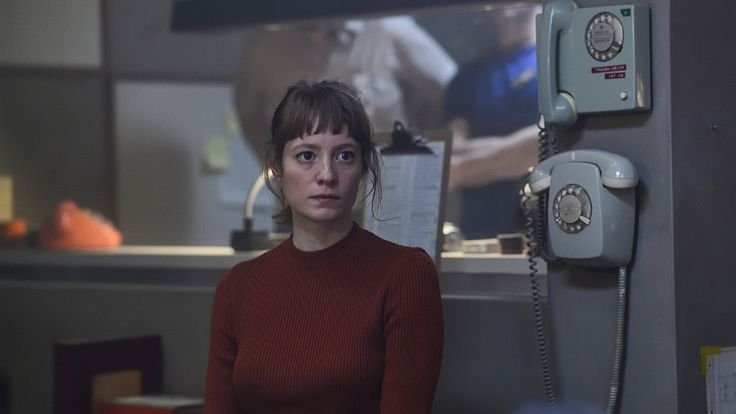
The film is short - barely 95 minutes - but if you feel that time flies when watching it, it's not only because of that but because of the great script it has. The tension relaxes briefly sometimes, but it never goes away. Every second there's a new situation to resolve, the clock ticks, time runs out and in the midst of confusion, contradictory information, hope and fear, the tension increases until it becomes almost unbearable (it gave me a physical sensation similar to when I saw Argo) in addition to presenting dilemmas, questions and moments that give a lot to think about, such as the fact that once again there were Jewish victims on German soil. It was the only thing that didn't have to happen. And that was precisely what happened.
La película es corta - apenas 95 minutos - pero si se siente que el tiempo vuela al verla no es sólo por eso sino por el gran guion que tiene. La tensión se relaja brevemente algunas veces, pero no desaparece nunca. A cada segundo hay una nueva situación que resolver, el reloj avanza, el tiempo se agota y en medio de la confusión, la información contradictoria, la esperanza y el miedo, la tensión aumenta hasta hacerse casi insoportable (me generó una sensación física parecida a cuando vi Argo) además de que presenta dilemas, preguntas y momentos que dan mucho que pensar como el hecho de que una vez más hubiera víctimas judías en suelo alemán. Era lo único que no tenía que ocurrir. Y eso fue precisamente lo que pasó.
Spielberg's Munich was a super production and had a great cast. But the casting of September 5 was also excellent. Peter Sarsgaard lives up to what he did in An Education and Experimenter; I loved John Magaro in The Big Short, but especially in Past Lives and here he does incredible; I don't remember seeing Ben Chaplin, but he also plays a great role here; and I loved Leonie Benesch in Das Lehrerzimmeraka (The Teachers’ Lounge), a film nominated for an Oscar last year, and in this new story she plays a key role in a wonderful performance. No, it's not the dream team that Spielberg made, but I never thought I would see these four actors together and I think the result was very positive and that the film gives us a new perspective, not only on the events that occurred that fateful day but also on the responsibility of reporting, the way in which many decisions must be made without time to think or judge all the scenarios and all the work that was at that time behind that little magic box called television. Before the Internet era and at the dawn of the satellite era, the amount of equipment, its volume, its weight, the deployment that had to be done to transmit a live event was incredible and also - in many cases - it was the only way to be in contact with the world and on the one hand it's a great responsibility, but on the other it's something to be grateful for as well, have any of you already seen September 5? Have you heard anything about this movie? I read you in the comments.
La Munich de Spielberg fue una super producción y tuvo un elenco bárbaro. Pero el casting de September 5 también fue excelente. Peter Sarsgaard está a la altura de lo que hizo en An Education y en Experimenter; a John Magaro lo amé en The Big Short, pero sobre todo en Past Lives y acá lo hace increíble; a Ben Chaplin no recuerdo haberlo visto, pero también se manda un gran papel aquí; y Leonie Benesch me encantó en Das Lehrerzimmeraka (The Teachers’ Lounge), película nominada a los Oscars el año pasado, y en esta nueva historia juega un rol clave en una actuación maravillosa. No, no es el dream team que hizo Spielberg, pero jamás pensé ver a estos cuatro actores juntos y creo que el resultado fue muy positivo y que la película nos da una nueva perspectiva, no sólo sobre los hechos ocurridos ese fatídico día sino también sobre la responsabilidad de informar, la forma en que muchas decisiones deben ser tomadas sin tiempo de pensar o juzgar todos los escenarios y todo el trabajo que había en esa época detrás de esa cajita mágica llamada televisor. Antes de la era del internet y en los albores de la era satelital, la cantidad de equipos, su volumen, su peso, el despliegue que había que hacer para transmitir un evento en vivo era increíble y además - en muchos casos - era la única manera de estar en contacto con el mundo y por un lado es una gran responsabilidad, pero por el otro es algo que agradecer también, ¿alguno de ustedes ya vio September 5? ¿habían oído algo de esta película? Los leo en los comentarios.
Reseñado por @cristiancaicedo
Other posts that may interest you | Otros posts que pueden interesarte:
 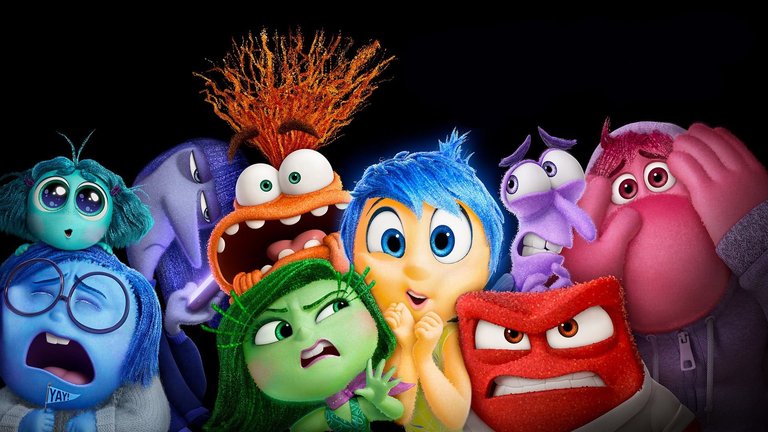 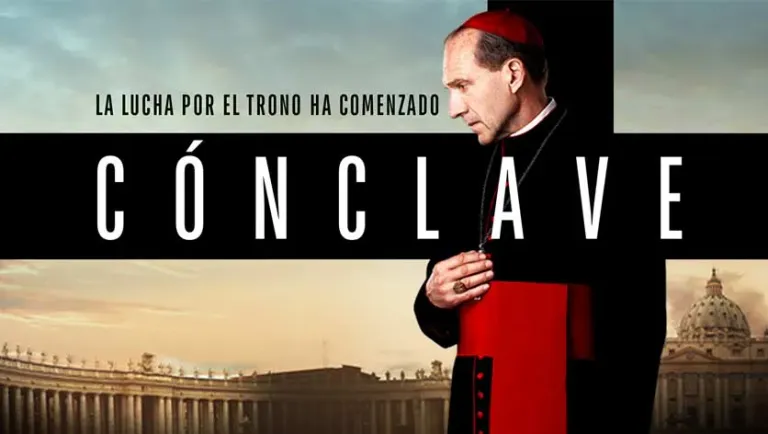 |
|---|
